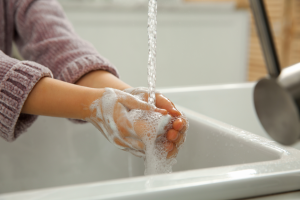Enjoy More Soap Suds by Installing a Water Softener: Insights from a Pentair Water Softening Company in East Dundee, Illinois
 The presence of hard water can cause a variety of different issues around the house. Some of these are aesthetic in nature, while others are functional. For many homeowners, one of the most frustrating issues is that hard water makes it difficult to produce soap suds.
The presence of hard water can cause a variety of different issues around the house. Some of these are aesthetic in nature, while others are functional. For many homeowners, one of the most frustrating issues is that hard water makes it difficult to produce soap suds.
Fortunately, you can combat hard water with the use of a Pentair water softener, which will allow you to produce all the soap suds you need. Are you looking for more information about the process? This Pentair water softening company in East Dundee, Illinois is going to explain below.
How Does Hard Water Affect Soap Suds?
When water and soap come into contact, a chemical reaction occurs. This chemical reaction results in the formation of soap suds.
The issue is when there are contaminants in the water. These can impair the chemical reaction between soap and water, and therefore reduce the number of soap suds that are able to form. Calcium and magnesium, specifically, can have this effect.
What is highly present in hard water? Calcium and magnesium. When water is hard, it makes it extremely difficult for suds to form after having contacted soap. The harder the water, the fewer soap suds you’ll be able to produce.
This is a frustrating issue for many homeowners, as soap suds are integral to getting things clean. Without soap suds, you have nothing more than a slick lather. Not only will this struggle to clean things thoroughly, but it won’t go all that far either.
As a result, you’ll have to use more soap to clean the same amount of area. It wastes money, not to mention time. Plus, it just feels less satisfying, and psychologically leaves you questioning whether the item in question is getting clean at all.
Fortunately, there is a way to remove calcium and magnesium from water. You can speak with your local Pentair water softening company in East Dundee, Illinois about installing a water softener to combat the issue.
How the Water Softener Eliminates Calcium and Magnesium from Water
We’ve discussed the way that calcium and magnesium particles prevent soap suds from forming. Now, let’s talk about how the water softener can eliminate calcium and magnesium from a water supply.
It revolves around a single scientific process: ion exchange. Ion exchange is when a positively charged ion swaps place with a negatively charged ion. As far as the water softener goes, sodium ions swap places with magnesium and calcium particles.
First, sodium ions are stored on resin beads. These sit within the water softener’s tank and essentially lie in wait for calcium and magnesium particles to come through. When they do come through, they exchange places with the sodium ions, thereby latching onto the resin beads while the sodium ions enter the water.
By the time the water leaves the water softener, it’s entirely void of calcium and magnesium particles. All that it contains is small amounts of sodium. This sodium has essentially no effect on the water. Therefore, its quality is greatly improved compared to before it went into the water softener.
In other words, the water is soft. As was noted above, soft water doesn’t impair the chemical reaction with soap. Therefore, it allows its users to produce optimal soap suds.
To keep the water softener running, you need only to fill it with softener salt. Do this every one to two months, and you’ll have ample soap suds from there on out. If you need help with this task, you can always reach out to your local Pentair water softening company in East Dundee, Illinois.
Looking for a Pentair Water Softening Company in East Dundee, Illinois?
Do you want to be able to produce more soap suds in your home? Looking for a reputable Pentair water softening company in East Dundee, Illinois who can install a new system for you? If so, you’ve come to the right place — our team at Johnson Water Conditioning is here to help.
Contact us today to request a free estimate.

 Better Water for
a Better Life
Better Water for
a Better Life
